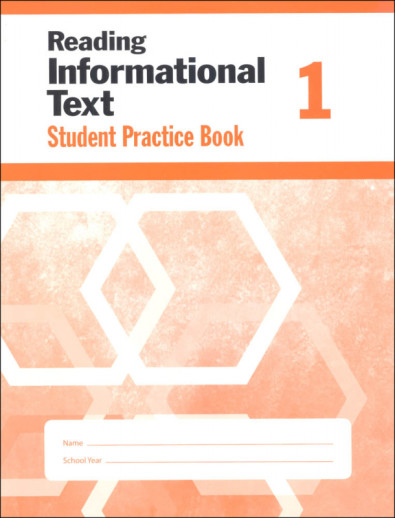We use cookies to make your experience better. To comply with the new e-Privacy directive, we need to ask for your consent to set the cookies. Learn more.
Reading Informational Text Grade 1 - Individual Student Workbook
This 1st Grade Student Practice Book (Individual Student Workbook) provides student pages that are not reproducible. There is no answer key. It's designed to be used with an additional student or when you prefer to not make copies from the Teacher Book.
Student books are ideal for informational text practice in the classroom or as homework! Each student book provides content-area articles with embedded nonfiction text structures and activities that correspond to the teacher's edition.
The student book pages provide:
· Articles that cover grade-level content-area topics
· Dictionary pages with content and academic vocabulary
· Close reading and comprehension activities
· Vocabulary activities
· Text structure activities
· Text-based writing activities
The Common Core standards differentiate between particular types of reading material and, thus, are re-orienting the way we think about reading and writing tasks. For instance, informational text is now mentioned specifically and, therefore, must be built into the curriculum so students are well prepared for achievement testing. Informational Text has both specific elements and various types of structure. An element is something you can think about or look for in the text - purpose for reading, major ideas, supporting details, visuals/graphics, and vocabulary. A structure is how a text is organized and how the main ideas are shared. Structures typically found in information texts include main idea/details, time order, compare/contrast, cause/effect, and question/answer. These elements and structures are not new - in fact, they're found in most reading comprehension texts and supplements. However, now we're looking for them specifically and making sure the material we're reading provides both the elements and structures. With this teacher's reproducible (for single classroom) workbook series Evan Moor is providing informational texts that conform to the CCSS expectations.
Units include science, social studies, geography, biography, and technology with one to three lessons in each unit. To give you an idea of topics, content area, and text structure, here are the lessons for the Grade 3 book: Big, Wild Cats! (Life Science, Compare/Contrast); Sandra Day O'Connor (Biography - Political Science, Time Order); Barack Obama (Biography - Political Science, Time Order); Plants of the Rainforest (Life Science, Main Idea/Details); The Great Lakes (Geography, Cause/Effect); Two Climates (Earth Science, Compare/Contrast); It's a Grand Old Flag (Social Studies - Sociology, Main Idea/Details); Mystery of Mesa Verde (Social Studies - U.S. History, Time Order); About Banks (Social Studies - Economics, Question/Answer); and The Zipper (Social Studies - Sociology, Cause/Effect).
As you would expect the introductory information in these books include an orientation to the units, correlations to both the CCSS and the Texas standards, an overview of articles and writing prompts, and reproducible pre-writing charts showing the Five Elements and the Five Structures of Information Text. In the Grade Level Teacher Books each lesson includes two pages of teacher information (objectives, preparation, and lesson plans) plus reproducible student pages and a complete answer key is provided. The corresponding Student Practice Books (Individual Student Workbooks) are not reproducible and they do not provide answer keys. They are designed for additional student or if you prefer to not make copies from the Teacher Book.
Student pages include:
- Content Area Article (two pages with illustrations in the Grade 3 book)
- Dictionary Page - defines content and academic words
- Identify Information - close reading activity (annotating the text article)
- Answer Questions - reading comprehension (multiple choice and whole sentence)
- Apply Vocabulary - choosing words to complete sentences
- Text Structure - examines how information is organized
- Write About It - text-based writing assignment
This well-done series provides quality reading comprehension and writing preparation that is correlated to the current state standards (most of which are CCSS). Conservative parents will likely sigh a bit at the content choices, while recognizing they are consistent and typical of the CCSS. 113 pgs, pb ~ Janice
| Product Format: | Paperback |
|---|---|
| Brand: | Evan-Moor |
| Grade: | 1 |
| ISBN: | 9781629381251 |
| Length in Inches: | 10.875 |
| Width in Inches: | 8.5 |
| Height in Inches: | 0.3125 |
| Weight in Pounds: | 0.55 |

